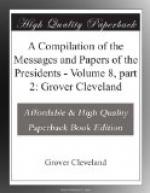The spirit of improvement is abroad upon the earth. It stimulates the hearts and sharpens the faculties not of our fellow-citizens alone, but of the nations of Europe and of their rulers. While dwelling with pleasing satisfaction upon the superior excellence of our political institutions, let us not be unmindful that liberty is power; that the nation blessed with the largest portion of liberty must in proportion to its numbers be the most powerful nation upon earth, and that the tenure of power by man is, in the moral purposes of his Creator, upon condition that it shall be exercised to ends of beneficence, to improve the condition of himself and his fellow-men. While foreign nations less blessed with that freedom which is power than ourselves are advancing with gigantic strides in the career of public improvement, were we to slumber in indolence or fold up our arms and proclaim to the world that we are palsied by the will of our constituents, would it not be to cast away the bounties of Providence and doom ourselves to perpetual inferiority? In the course of the year now drawing to its close we have beheld, under the auspices and at the expense of one State of this Union, a new university unfolding its portals to the sons of science and holding up the torch of human improvement to eyes that seek the light. We have seen under the persevering and enlightened enterprise of another State the waters of our Western lakes mingle with those of the ocean. If undertakings like these have been accomplished in the compass of a few years by the authority of single members of our Confederation, can we, the representative authorities of the whole Union, fall behind our fellow-servants in the exercise of the trust committed to us for the benefit of our common sovereign by the accomplishment of works important to the whole and to which neither the authority nor the resources of any one State can be adequate?
Finally, fellow-citizens, I shall await with cheering hope and faithful cooperation the result of your deliberations, assured that, without encroaching upon the powers reserved to the authorities of the respective States or to the people, you will, with a due sense of your obligations to your country and of the high responsibilities weighing upon yourselves, give efficacy to the means committed to you for the common good. And may He who searches the hearts of the children of men prosper your exertions to secure the blessings of peace and promote the highest welfare of our country.
John Quincy Adams.
SPECIAL MESSAGES.
Washington,
December 14, 1825.
To the Senate of the United States:
I transmit to the Senate, for their consideration and advice with regard to their ratification, the following treaties:
1. A treaty between the United States and the Great and Little Osage tribes of Indians, concluded at St. Louis, in the State of Missouri, on the 2d day of June last, by William Clark, Superintendent of Indian Affairs, commissioner on the part of the United States, and the chiefs, headmen, and warriors of the same tribes, duly authorized and empowered by their respective tribes or nations.




